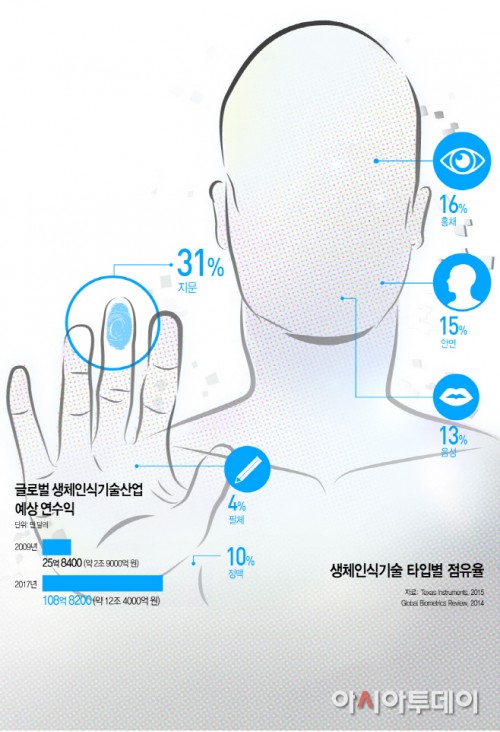 |
By AsiaToday reporter Kim Eun-young - Biometrics technology is spreading rapidly in Asia-Pacific countries in all aspects of life, including economics, politics, medical care and security. At the same time, attention is being drawn to the changing lifestyle of Asian Millennial generation (those born between the early 1980s and the early 2000s) that have emerged as the main user base of biometrics technology.
In the economic sector, FinTech is extending to biometrics technology, allowing Millennials free up their hands for other tasks. Reuters and other foreign sources reported on Oct. 12 that China's Alibaba demonstrated 'VR Pay' that will allow virtual reality shoppers with virtual reality goggles to pay for things in future just by nodding their heads, touching, or staring at a point on virtual display and that the new payment system is expected to be ready for commercial launch by the end of this year. Last year, Alibaba used facial recognition tech for mobile payment service 'Alipay'.
Japan's Ogaki Kyoritsu Bank plans to install its palm scanning equipment for authentication at the counters of all its roughly 160 branches from next spring, The Asahi Shimbun reported recently. For registration, all you have to do is input your birthday and put your palm on the scanner for a few seconds. By doing so, you can withdraw cash, make deposits without ID cards, bank cards, passbooks, and stamps. The bank introduced the service in reponse to the large number of people who lost their cards and other forms of personal identification in the wake of 2011 earthquake.
Biometric technology is expected to change the way Millennials manage their health. In India, biometrics technology is emerging as an effective solution to shortage of medical manpower. According to technology magazine Motherboard, an Indian research team recently developed a cognitive healthcare system called IoT Vaidya, which links rural patients with doctors, where they might practice, using sensors and cloud technology. The system uses biomedical sensors to acquire a patient's vitals, like blood pressure and temperature, which are then sent to the cloud where they can be accessed by a physician. This way, a doctor in any corner of the world, would be able to diagnose a patient's problem. IoT Vaidya co-founder Mahavir Dwivedi revealed why his team developed the system, "India still suffers from a critical shortage of doctors. The situation is particularly bad in rural areas. 70% of the Indian population has access to less than 20% of physicians."
San Francisco- and Hong Kong-based Good Parents Inc. developed Kiddo, a health wearable that uses biometrics technology to allow parents understand the health of their children aged 4-10 years. Kiddo provides real-time data to parents regarding health, wellbeing, stress and development of the child, translating this data into insights presented on a mobile app. "We are building a tool that will make it easy for parents to understand their children's health and ensure they never miss important issues," said Jaganah Swamy, co-founder of Good Parents. The company recently has attracted approximately $2 million seed investment from Asian and American investors, and has partnered with Samsung and Foods for Health Institute based at University of California Davis for enhancing product capability, validation and functionality, reported Southeast Asian business news platform DealStreetAsia. Good Parents plans to showcase Kiddo at CES in January next year.
Meanwhile, biometrics technology is also expected to help prevent crimes. The Philippines' Bureau of Immigration (BI) is planning to install a biometric identification system at Manila's Ninoy Aquino International Airport (NAIA) that will be linked to Interpol databases, reported Philippine's Manila Times on Oct. 24. The system will take photos of all passengers that will be checked against Interpol’s criminal databases to flag any fugitives. Immigration Commissioner Jaime Morente said, "The interconnectivity between the BI and Interpol is nearly in place as computer programmers have been conducting dry runs and technical tests."
Biometrics technology is making a contribution towards combating election fraud. The National Election Committee (NEC) of Cambodia introduced a new computerized voter registration system that will use biometrics to eliminate "ghost voters" for upcoming local and national elections, reported Southeast Asian media ASEAN Today in September. The new registration drive is being rolled out as during national elections in 2013 Cambodia's main party was accused of high-level electoral fraud. "By linking names to thumbprints, the new electronic voter registration system will prevent people from voting twice under one name, or voting under another person’s name," said the head of the department of voter database management, Tob Rethy.
While it all looks rosy for Millennials, biometric technology could also lead to new opportunities for surveillance as long as there is the risk of database leaks. Russian security firm Kaspersky Lab found that there are already at least 12 sellers offering skimmers capable of stealing victims' fingerprints, and at least 3 underground sellers researching devices that could illegally obtain data from palm vein and iris recognition systems. "The problem with biometrics is that unlike passwords or pin codes, which can be easily modified in the event of compromise, it is impossible to change your fingerprint or iris image," said Olga Kochetova, security expert at Kaspersky Lab. "Thus, if your data is compromised once, it won't be safe to use that authentication again."
According to a new study released by Microsoft and National Cyber Security Alliance (NCSA), 49% of the victims exposed to tech support scams were Millennials aged 18 to 34. Only 17% were older than 55. Millennials are more likely to fall for fraudsters' complex strategies. The generation that has grown up attached to technology also has a high reliance on their devices. In addition, the US CNBC reported last month that Asia is a prime target for cybercriminals due to its large potential victim pool to target and comparatively lower awareness towards cyber threats and cyber security than other regions, such as the United States and Europe. Therefore, whether biometric technology will advance or limit our freedom depends on not only the development of security technology but also the maturity of security consciousness.
#biometrics technology #millennials #Kiddo #Good Parents #VR Pay
Copyright by Asiatoday
Most Read
-
1
-
2
-
3
-
4
-
5
-
6
-
7





















